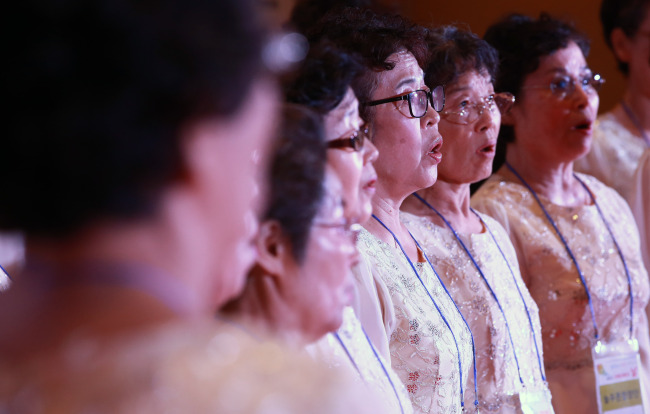Women in or post-menopause are the most vulnerable to colorectal cancer among the Korean population, while the number of female patients who develop the disease is on rise nationwide, a hospital report showed.
According to the report released by the Ewha Womans University Mokdong Hospital, colorectal cancer was the most common cancer among Korean women aged 65 or older this year. For women in all age groups, it was the third most common cancer, following breast and thyroid cancer.
According to National Cancer Center of Korea, the number of female colorectal cancer patients has been on the rise from 1999-2012, with an average annual increase rate of 4.3 percent.
 |
| Colorectal cancer was the most common cancer among Korean women aged 65 or older this year. (Yonhap) |
In Korea, the particular cancer has been generally regarded as a disease that is more common in men. Korea in fact had the third highest rate of colorectal cancer in men — 58.7 men per 100,000 — in the world back in 2012. In the same year, Korea had the fifth highest rate of colorectal cancer in women — 33.3 women per 100,000 — in the world, following Norway, Denmark, the Netherlands and New Zealand.
“What many are not aware is that aging women are more vulnerable to this particular type of cancer,” said Dr. Kim Kwang-ho from the hospital. “One of the reasons why so many elderly women develop the disease is because not a lot of them get screened regularly for colorectal cancer thinking it’s more prone in men. But this has to change now.”
From 1993-2012, the five-year relative survival rate for Korean women colorectal cancer patients (65.9 percent), was significantly lower than their male counterparts (70.5 percent). While colorectal cancer is the most prevalent cancer in women aged 65 or older, it is the third highest cancer among Korean men in the same age group.
According to Dr. Kim, women in and post-menopause are more vulnerable to the cancer because estrogen is what protects women from gaining excess belly weight which is significantly linked to colorectal cancer.
Most women gain excess belly weight, especially inside the belly, as they go through menopause, as their estrogen levels drop. When women’s menstrual cycle ends, body fat is often redistributed from the hips, buttocks and thighs to the abdomen. And those with excessive amounts of visceral fat have a higher chance of developing colorectal cancer.
According to the hospital, 44.5 percent of Korean women who went through menopause develop abdomen-obesity, while only 32.1 percent of who are in their pre-menopause phase experience the same. “One’s risk of developing colorectal cancer increases with increasing waist circumference,” said the report. “A woman’s chance of developing the disease increases by 16 percent per 10 centimeter increase in her waistline.”
To prevent the disease, Dr. Kim recommended that those aged 50 or older get regular screening, such as colonoscopy or flexible sigmoidoscopy, every five to 10 years. People with a family history of colorectal cancer should begin testing at younger ages, he said. According to Kim, one can reduce their chance of developing the disease by 90 percent just by getting screened regularly.
The doctor also recommended women aged 50 or older to be physically active, get enough calcium and avoid smoking. There is a good evidence that getting enough calcium helps protect against colorectal cancer. The doctor also stressed the importance of not smoking. “Women who smoke have a 20 percent higher chance of developing colorectal cancer than those who don’t,” he said.
By Claire Lee(dyc@heraldcorp.com)

